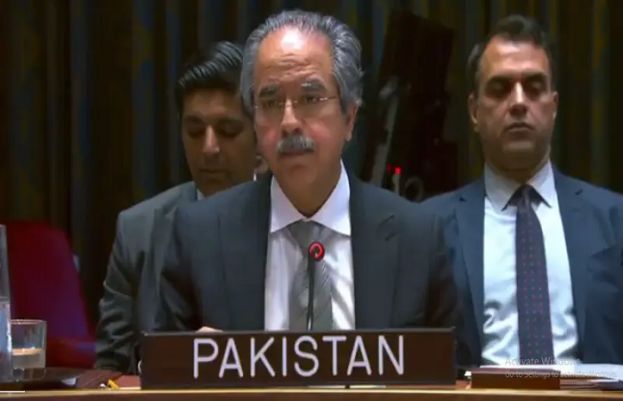Pakistan has told the UN Security Council that terrorism from Afghanistan remains the gravest threat to its national security, urging that the issue be addressed as a priority for regional peace.Speaking at the Council’s briefing on Afghanistan, Pakistan’s Permanent Representative to the UN, Ambassador Asim Iftikhar Ahmad, said that multiple terrorist entities, including Daesh-K, Al-Qaeda, Tehreek-e-Taliban Pakistan (TTP), East Turkestan Islamic Movement (ETIM), Balochistan Liberation Army (BLA) and the Majeed Brigade — continue to operate from Afghan sanctuaries. He said more than 60 terrorist camps are functioning as hubs for cross-border infiltration and attacks, adding that Pakistan has “credible evidence” of collaboration among these groups through joint training, illicit weapons trade, refuge to militants and coordinated assaults aimed at civilians, security forces and development projects in Pakistan. Ambassador Iftikhar highlighted the online dimension of the threat, saying nearly 70 propaganda accounts traced to Afghan IP addresses were being used by these groups and must be curbed with the cooperation of social media platforms. The envoy said Pakistan and China had jointly requested the UN’s 1267 Sanctions Committee to list the BLA and Majeed Brigade and expressed hope for swift action on the proposal. He described the TTP, with an estimated 6,000 fighters, as the largest terrorist group on Afghan soil and said Pakistan had foiled several infiltration attempts, seizing sophisticated military-grade weapons left behind by foreign forces during their withdrawal from Afghanistan. He said these operations had come at a heavy cost, noting that 12 Pakistani soldiers were martyred this month while defending the borders. Ambassador Iftikhar also drew attention to Afghanistan’s economic and humanitarian crisis, pointing out that the UN’s 2025 Humanitarian Needs and Response Plan had received only 27% of its required funding. He said Pakistan had hosted millions of Afghan refugees for over four decades, often with inadequate international assistance, and called for a fairer sharing of the burden. While acknowledging that civil war in Afghanistan had ended for the first time in 40 years, the ambassador said the situation remained “deeply worrying” and stressed that sustained engagement — rather than isolation — was the only way to achieve peace.
Afghan-Origin Terrorism a Critical Threat, Pakistan Informs UN

